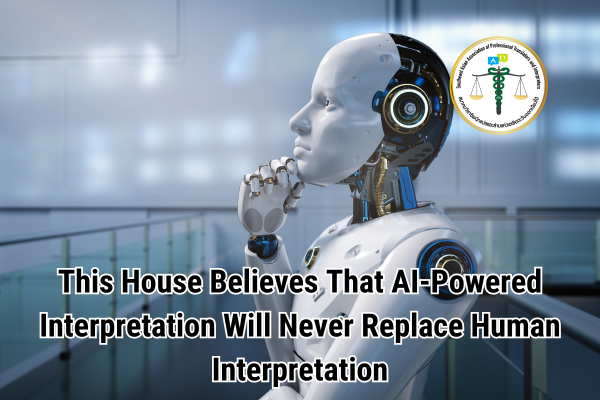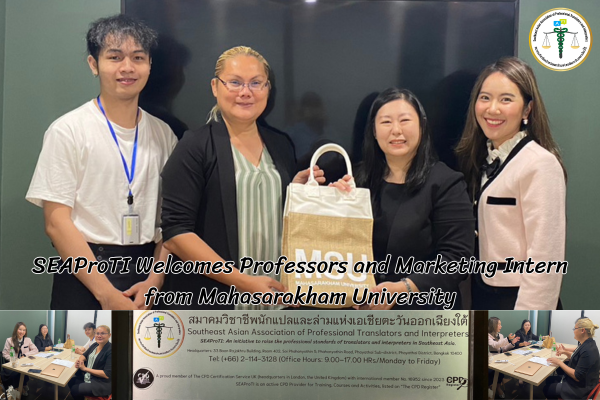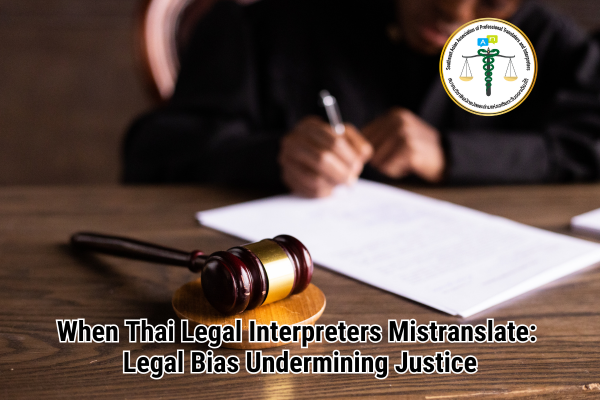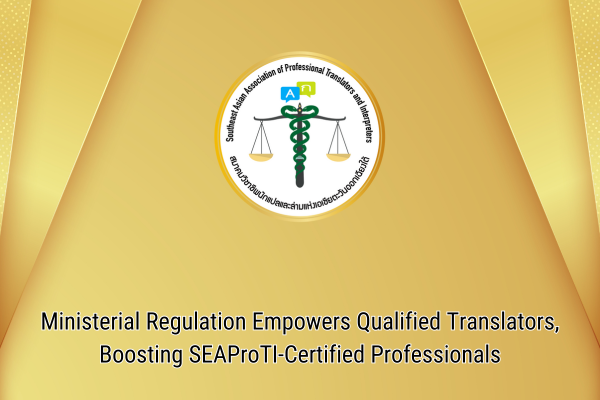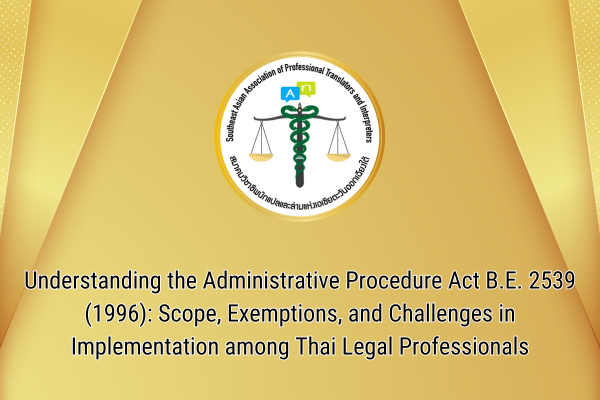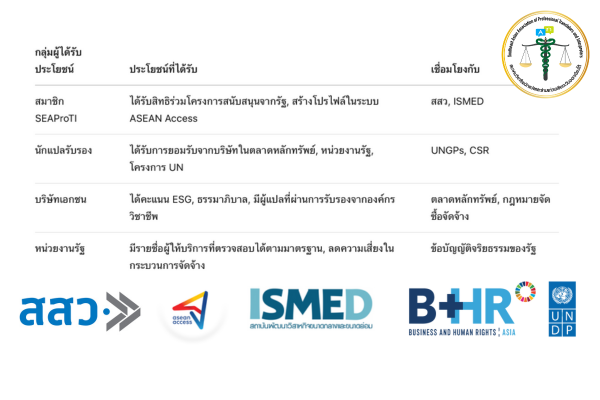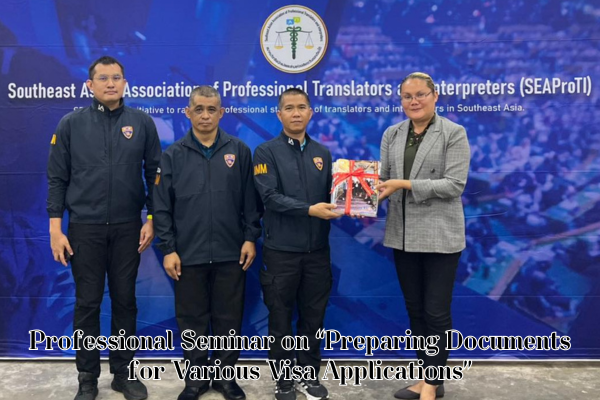This House Believes That AI-Powered Interpretation Will Never Replace Human Interpretation
12 February 2025, Bangkok – The intersection of artificial intelligence and language services is a topic of intense debate, as technological advancements continue to challenge traditional models of communication. In a recent Oxford-style debate moderated by Andrea Grosso, Pedagogical Assistance Coordinator at the Talent Development Unit, Directorate-General for Interpretation, European Commission, two leading experts presented opposing views on whether AI-powered interpretation will ever replace human interpretation. (See schedule)
The Case for Human Interpretation
Speaking in favor of the motion, Gry Hasselbalch, co-founder of DataEthics.eu, argued that while AI-powered interpretation has made significant strides, it remains fundamentally limited in its ability to replace human interpreters. Her arguments focused on three core areas:
1. The Complexity of Human Communication
Hasselbalch emphasized that language is more than just words; it involves cultural context, emotional intelligence, and nuanced meaning that AI struggles to grasp. Human interpreters bring not only linguistic expertise but also the ability to detect tone, irony, and subtext, which are essential in diplomatic, legal, and business settings.
2. Ethical and Accountability Issues
Another critical point raised was accountability. In high-stakes scenarios, such as courtrooms or international diplomacy, a misinterpretation can have severe legal and political consequences. When AI makes an error, who is responsible? Unlike human professionals, AI lacks ethical reasoning and the ability to explain its decisions.
3. The Role of Trust in Interpretation
Interpretation often takes place in sensitive situations where trust is paramount—be it between political leaders negotiating a treaty or a refugee seeking asylum. Hasselbalch argued that people trust human interpreters to represent their voices accurately, something AI, as an impersonal machine, may never fully achieve.
The Case for AI-Powered Interpretation
On the opposing side, Jürgen Schmidhuber, co-chair of the Center of Excellence for Generative AI at King Abdullah University of Science and Technology (KAUST), made a compelling case for AI’s potential to replace human interpreters. His argument centered on the rapid advancements in deep learning and neural networks, which he believes will soon surpass human performance in interpretation.
1. The Exponential Growth of AI Capabilities
Schmidhuber pointed out that AI models are already achieving remarkable accuracy in real-time translation and interpretation. With continued progress in natural language processing (NLP), machine learning, and large language models, AI will eventually be able to process and interpret speech faster and more efficiently than humans.
2. Scalability and Accessibility
One of AI’s strongest advantages is its ability to scale interpretation services globally. Unlike human interpreters, who have limitations in availability and cost, AI-powered tools can provide instant, multilingual interpretation at minimal expense. This could help bridge linguistic divides in areas where human interpreters are scarce, making interpretation more accessible to a wider population.
3. The Argument for Hybrid Systems
While Schmidhuber acknowledged that AI may not yet be perfect, he suggested that a hybrid model, where AI complements human interpreters, could soon become the norm. AI could handle high-volume, low-risk translation tasks, while humans focus on complex, high-stakes communication. Over time, as AI technology improves, its role in interpretation will continue to expand.
The Verdict: AI as a Tool, Not a Replacement—Yet
The debate highlighted the inevitable role of AI in shaping the future of interpretation, but also underscored its limitations in replicating human cognition and emotional intelligence. While Schmidhuber made a strong case for AI’s ability to enhance and scale interpretation services, Hasselbalch’s arguments about trust, ethical concerns, and the richness of human communication resonated with those who believe interpretation is more than just converting words from one language to another.
In the end, the motion “This house believes that AI-powered interpretation will never replace human interpretation” remains a topic of ongoing discussion. AI is not yet capable of fully replacing human interpreters, but its role as a tool for efficiency and accessibility is undeniable. The future of interpretation may not be about AI versus humans, but rather about how the two can work together to bridge language gaps while preserving the integrity of communication.
About the Author
Wanitcha Sumanat is the President of the Southeast Asian Association of Professional Translators and Interpreters (SEAProTI) with extensive experience in legal and medical translation and interpreting. In addition to her work in the language industry, she serves as an arbitrator and mediator for the Ministry of Justice, the Royal Thai Police, and the Ministry of Defense in the Kingdom of Thailand. Through her diverse roles, Wanitcha is dedicated to upholding professional standards and fostering effective communication across legal and medical sectors.
SEAProTI’s certified translators, translation certification providers, and certified interpreters:
The Southeast Asian Association of Professional Translators and Interpreters (SEAProTI) has officially announced the criteria and qualifications for individuals to register as “Certified Translators,” “Translation Certification Providers,” and “Certified Interpreters” under the association’s regulations. These guidelines are detailed in Sections 9 and 10 of the Royal Thai Government Gazette, issued by the Secretariat of the Cabinet under the Office of the Prime Minister of the Kingdom of Thailand, dated July 25, 2024, Volume 141, Part 66 Ng, Page 100.
To read the full publication, visit: the Royal Thai Government Gazette
มติที่ว่าการแปลแบบเรียลไทม์โดย AI จะไม่มีวันมาแทนที่มนุษย์
12 กุมภาพันธ์ 2568, กรุงเทพมหานคร – ปัจจุบัน การพัฒนาเทคโนโลยีปัญญาประดิษฐ์ (AI) ได้สร้างความท้าทายให้กับรูปแบบการสื่อสารแบบดั้งเดิม รวมถึงงานล่ามและการแปล การอภิปรายในรูปแบบ Oxford-style debate ที่จัดขึ้นเมื่อไม่นานมานี้ ได้เปิดโอกาสให้ผู้เชี่ยวชาญสองฝ่ายนำเสนอความคิดเห็นที่แตกต่างกันในประเด็นที่ว่า “AI จะไม่มีวันมาแทนที่การแปลแบบเรียลไทม์โดยมนุษย์”
การอภิปรายครั้งนี้ดำเนินรายการโดย Andrea Grosso ผู้ประสานงานฝ่ายช่วยเหลือทางการศึกษา หน่วยพัฒนาบุคลากร สังกัด Directorate-General for Interpretation, European Commission และมีผู้ร่วมอภิปรายสองฝ่าย ได้แก่
- ฝ่ายสนับสนุนมติ (AI จะไม่มีวันมาแทนที่ล่ามมนุษย์)
Gry Hasselbalch ผู้ร่วมก่อตั้ง DataEthics.eu - ฝ่ายคัดค้านมติ (AI จะมาแทนที่ล่ามมนุษย์ในที่สุด)
Jürgen Schmidhuber ประธานร่วมของ Center of Excellence for Generative AI, King Abdullah University of Science and Technology (KAUST)
ข้อโต้แย้งของฝ่ายสนับสนุนมติ: ล่ามมนุษย์จะไม่มีวันถูกแทนที่
Gry Hasselbalch นำเสนอประเด็นหลัก 3 ข้อที่สนับสนุนว่าการแปลโดย AI จะไม่สามารถมาแทนที่มนุษย์ได้อย่างสมบูรณ์
1. ความซับซ้อนของภาษามนุษย์
เธอชี้ให้เห็นว่า ภาษาคือมากกว่าคำพูด เพราะมันเกี่ยวข้องกับ บริบททางวัฒนธรรม อารมณ์ และความหมายที่ซ่อนอยู่ ซึ่ง AI ยังเข้าใจได้ไม่ลึกซึ้งเท่ามนุษย์ ล่ามมืออาชีพสามารถจับน้ำเสียง (tone) การประชดประชัน (sarcasm) และบริบทแฝงของคำพูดได้ ซึ่งเป็นทักษะที่ AI ยังขาด
2. ประเด็นทางจริยธรรมและความรับผิดชอบ
เมื่อเกิดความผิดพลาดในการแปลโดย AI ใครจะเป็นผู้รับผิดชอบ? ในสถานการณ์ที่มีความเสี่ยงสูง เช่น ศาลยุติธรรม หรือการเจรจาทางการทูต การตีความผิดเพียงเล็กน้อยอาจส่งผลกระทบใหญ่หลวง แต่ AI ไม่มีความสามารถในการตัดสินใจเชิงจริยธรรม และไม่สามารถอธิบายเหตุผลของการแปลได้
3. ความเชื่อมั่นในการใช้ล่ามมนุษย์
ในการแปลแบบเรียลไทม์ที่เกี่ยวข้องกับเรื่องละเอียดอ่อน เช่น การไกล่เกลี่ยข้อพิพาท การให้ปากคำของพยาน หรือการประชุมระหว่างผู้นำโลก ความน่าเชื่อถือของล่ามมีความสำคัญมาก Hasselbalch เน้นย้ำว่า ผู้คนยังคงไว้วางใจมนุษย์มากกว่า AI ในการสื่อสารเรื่องที่มีความหมายลึกซึ้ง
ข้อโต้แย้งของฝ่ายคัดค้านมติ: AI จะสามารถแทนที่ล่ามมนุษย์ได้ในอนาคต
Jürgen Schmidhuber นักวิจัยผู้บุกเบิกด้าน Deep Learning และหนึ่งในบุคคลที่อยู่เบื้องหลังเทคโนโลยี LSTM (Long Short-Term Memory) โต้แย้งว่าการแปลแบบเรียลไทม์โดย AI กำลังพัฒนาไปสู่จุดที่สามารถแข่งขันกับมนุษย์ได้ เขาเน้นย้ำ 3 ประเด็นสำคัญ
1. ความก้าวหน้าของ AI ในการเรียนรู้ภาษา
Schmidhuber ชี้ให้เห็นว่า AI ในปัจจุบันกำลังก้าวหน้าอย่างรวดเร็วในด้าน การประมวลผลภาษาธรรมชาติ (NLP) และสามารถเรียนรู้ โครงสร้างไวยากรณ์ สำนวน และความหมายเชิงบริบท ได้ดียิ่งขึ้น เขาเชื่อว่าในอีกไม่กี่ปีข้างหน้า AI จะสามารถ ประมวลผลและแปลภาษาได้เร็วกว่ามนุษย์
2. การเข้าถึงและความสามารถในการขยายตัวของ AI
หนึ่งในข้อได้เปรียบของ AI คือ ความสามารถในการให้บริการได้ตลอดเวลา โดยไม่มีข้อจำกัดด้านต้นทุนหรือจำนวนบุคลากร เทียบกับล่ามมนุษย์ที่มีข้อจำกัดด้าน เวลา ค่าใช้จ่าย และความพร้อมในการให้บริการ AI สามารถช่วยให้บริการแปลภาษาแก่ผู้คนจำนวนมากขึ้นทั่วโลก
3. รูปแบบการทำงานแบบไฮบริด (AI + มนุษย์)
แม้ว่า AI อาจยังไม่สามารถแทนที่ล่ามมนุษย์ได้ 100% แต่ Schmidhuber เสนอแนวคิดว่า AI และมนุษย์สามารถทำงานร่วมกัน ได้ โดย AI อาจช่วยแปล เนื้อหาทั่วไปที่ไม่ซับซ้อน ส่วนมนุษย์ยังคงมีบทบาทสำคัญใน สถานการณ์ที่ต้องใช้วิจารณญาณและความเข้าใจเชิงลึก
บทสรุป: AI เป็นเครื่องมือเสริม แต่ยังไม่ใช่ตัวแทนของมนุษย์
แม้ว่า AI จะก้าวหน้าจนสามารถช่วยเหลือการแปลแบบเรียลไทม์ได้อย่างมีประสิทธิภาพ แต่ยังมีข้อจำกัดในเรื่อง ความเข้าใจบริบท วัฒนธรรม และจริยธรรม ซึ่งเป็นสิ่งที่ AI ยังทำได้ไม่ดีเท่ามนุษย์
ฝ่ายสนับสนุนมติ โต้แย้งอย่างหนักแน่นว่า AI ไม่มีทางแทนที่มนุษย์ในงานแปลที่ต้องใช้ ความเข้าใจเชิงลึก อารมณ์ และความละเอียดอ่อนของภาษา ขณะที่ ฝ่ายคัดค้านมติ ชี้ให้เห็นว่า AI กำลังพัฒนาอย่างรวดเร็ว และในอนาคตอาจทำให้การใช้ล่ามมนุษย์ลดลง
ดังนั้น คำถามที่แท้จริงอาจไม่ใช่ “AI จะมาแทนที่มนุษย์หรือไม่?” แต่เป็น “AI และมนุษย์จะสามารถทำงานร่วมกันได้อย่างไร?” การใช้ AI ในงานแปลเป็นสิ่งที่ หลีกเลี่ยงไม่ได้ แต่การรักษาคุณค่าของล่ามมนุษย์ก็ยังคงเป็นสิ่งสำคัญ
ในท้ายที่สุด มติที่ว่า “AI จะไม่มีวันมาแทนที่ล่ามมนุษย์” อาจยังไม่มีคำตอบที่ชัดเจนในวันนี้ แต่สิ่งที่แน่นอนคือ AI จะเข้ามามีบทบาทในวงการแปลและล่ามมากขึ้นเรื่อยๆ และอนาคตของวิชาชีพนี้จะถูกกำหนดโดย วิธีที่มนุษย์และเทคโนโลยีจะผสานพลังกัน เพื่อให้เกิดประโยชน์สูงสุดแก่การสื่อสารระหว่างภาษาและวัฒนธรรมทั่วโลก
เกี่ยวกับผู้เขียน
วณิชชา สุมานัส ดำรงตำแหน่งนายกสมาคมวิชาชีพนักแปลและล่ามแห่งเอเชียตะวันออกเฉียงใต้ (SEAProTI) มีประสบการณ์เชี่ยวชาญด้านการแปลและล่ามทางกฎหมายและการแพทย์มาอย่างยาวนาน นอกจากบทบาทในแวดวงภาษาแล้ว ยังทำหน้าที่เป็นอนุญาโตตุลาการและผู้ไกล่เกลี่ยให้กับกระทรวงยุติธรรม สำนักงานตำรวจแห่งชาติ และกระทรวงกลาโหม แห่งราชอาณาจักรไทย ด้วยบทบาทที่หลากหลาย วณิชชามุ่งมั่นที่จะยกระดับมาตรฐานวิชาชีพและส่งเสริมการสื่อสารที่มีประสิทธิภาพในภาคส่วนทางกฎหมายและการแพทย์
เกี่ยวกับนักแปลรับรอง ผู้รับรองการแปล และล่ามรับรองของสมาคมวิชาชีพนักแปลและล่ามแห่งเอเชียตะวันออกเฉียงใต้
สมาคมวิชาชีพนักแปลและล่ามแห่งเอเชียตะวันออกเฉียงใต้ (SEAProTI) ได้ประกาศหลักเกณฑ์และคุณสมบัติผู้ที่ขึ้นทะเบียนเป็น “นักแปลรับรอง (Certified Translators) และผู้รับรองการแปล (Translation Certification Providers) และล่ามรับรอง (Certified Interpreters)” ของสมาคม หมวดที่ 9 และหมวดที่ 10 ในราชกิจจานุเบกษา ของสำนักเลขาธิการคณะรัฐมนตรี ในสำนักนายกรัฐมนตรี แห่งราชอาณาจักรไทย ลงวันที่ 25 ก.ค. 2567 เล่มที่ 141 ตอนที่ 66 ง หน้า 100 อ่านฉบับเต็มได้ที่: นักแปลรับรอง ผู้รับรองการแปล และล่ามรับรอง


